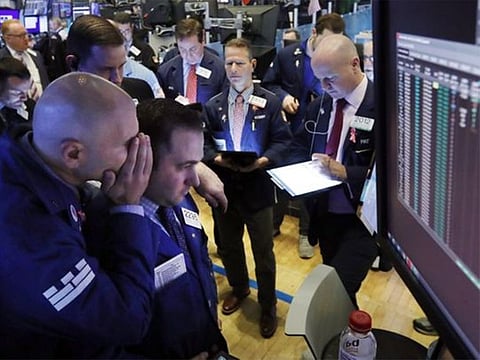Paranoia of a possible second COVID-19 wave grip investors
Resurgence in US COVID-19 infections, renewed geopolitical tensions reignite worries

Dubai: Investors are turning increasingly worried that a possible second wave of new COVID-19 infections may be round the corner, as focus shifts to a surge in cases in the top economy, US.
Markets worldwide were seesawing all through last week as new data showed that the coronavirus outbreak is not yet under control in several countries – underscoring the fact that the disease is here to stay until at least vaccines become widely available.
Analysts continue to be off the opinion that market prospects will begin and end with the epidemic subsiding or at least the discovery of credible treatments and vaccines. However, there are other factors that also have the potential to exacerbate volatility in financial markets next week and into July, analysts view.
Market risks
There is currently some concern on whether top economies have stalled plans for further economic stimulus, with some experts saying that without extra aid soon, there will be an absence of catalyst for both the economy and the market.
Wall Street’s top benchmark S&P 500 had ended the week nearly 3 per cent lower as trading turned much volatile after record numbers of daily US COVID-19 cases, an uptick in geopolitical tensions between the US and countries worldwide.
With the markets closed in the US in observance of the Fourth of July holiday on Friday, the upcoming holiday-shortened week could exacerbate price swings, as traders tend to head out early on holidays.
Eyes on US
Apart from rising tensions with China, the US said it was considering a new round of tariffs on $3.1 billion in European exports from France, Germany, Spain and the UK – triggering fears of a renewed trade dispute between the US and EU.
After the US had recorded 45,000 new coronavirus cases in a single day last week – the highest daily total of the year, stocks traded lower as investors grew concerned that a resurgence in COVID-19 infections could negatively impact the economy and even trigger another round of shutdowns.
The rise in new coronavirus cases on Friday prompted Texas and Florida governors to reverse some business reopening measures, after those states were among the earliest to attempt to restart economies that had been facing severe social-distancing restrictions to curtail the spread of the contagion.
Growing virus threat
“The virus is contained in much of Northern Asia, Europe and former hot spots in the US such as New York and New Jersey, however, the virus is showing signs of spinning out of control in parts of emerging markets and a growing number of other US states,” analysts at Bank of America Merrill Lynch (BofA) wrote in a research report.
“The trade-off between the disease and the economy is unstable: absent containment measures, the virus could grow exponentially.”
Investors this week will also be mindful of any glaring economic surprises from the US Labor Department’s monthly jobs report due Thursday, due to the July 4 holiday being observed this year on Friday. The report for May showed a surprising 2.5 million jobs added, confounding expectations for another big decline and, perhaps, raising the expectations for a big bounce next week.
Trading on UAE bourses remain volatile
While the Dubai bourse benchmark started of the week on a lull note, the Abu Dhabi exchange index edged up – extending sessions of volatility seen during the previous week. Dubai Financial Market (DFM) index ended largely flat at 2,085 points. The benchmark rose for three out of the last five trading sessions, while declining the rest. The Abu Dhabi Securities Exchange (ADX) gained 0.5 per cent at 4,308 points. The index has, in contrast to the DFM, fell three out of the last five trading sessions, while rising the remaining two. Elsewhere in the GCC, the region’s top bourse – Saudi Arabia’s Tadawul – gained 0.7 per cent on the back of big gains from Samba Financial Group (up 9.9 per cent) and National Commercial Bank (NCB) (up 5.2 per cent) after the major banks announced a merger.








